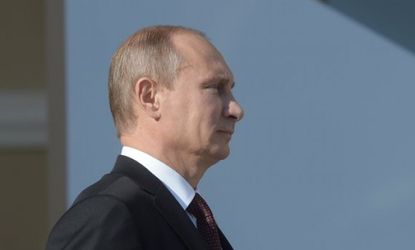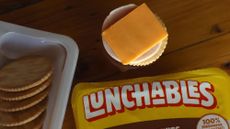3 ways the Syria peace plan could backfire on Vladimir Putin
Russia's president is looking like a master chess player with Syria. Looks can be deceiving.


Russian President Vladimir Putin is looking pretty clever these days. By pouncing on an apparently off-the-cuff remark by U.S. Secretary of State John Kerry, Putin has effectively put the brakes on U.S. plans to punitively bomb his ally, Syrian President Bashar al-Assad, for using chemical weapons on his own citizens. In doing so, Putin has again made Russia a big power broker on the world stage.
What's more, the proposal to disarm Syria of its chemical weapons suits Russia just fine. Putin doesn't want to risk Russia-hating Islamist militants getting their hands on Syria's poison-gas stockpiles, and Russia could actually profit — quite literally — from Syria's chemical disarmament: Israeli news media report that in return for Syria agreeing to give up its chemical munitions, Russia will sell Assad lots more conventional weaponry.
Putin must be getting a bit of an ego boost, too. There's a lot of talk in the international press and conservative U.S. media that Putin has "played" President Obama. And the Russian leader rubbed it in by penning — with a little help from PR firm Ketchum — a disingenuous, slightly mocking op-ed in The New York Times.
Subscribe to The Week
Escape your echo chamber. Get the facts behind the news, plus analysis from multiple perspectives.

Sign up for The Week's Free Newsletters
From our morning news briefing to a weekly Good News Newsletter, get the best of The Week delivered directly to your inbox.
From our morning news briefing to a weekly Good News Newsletter, get the best of The Week delivered directly to your inbox.
But some commentators suggest that Putin is being too clever by half. Here are three ways that Putin's diplomatic "masterstroke" — or "virtual end-zone twerk," if you prefer — could backfire:
1. Russia may get ownership over the Syria mess
Whatever national humiliation America is suffering right now is totally worth it, says Andrew Sullivan at The Dish. The more Obama can do to "keep Putin in this triumphant mood, the better." In fact, Sullivan adds, "if the end result is that Putin effectively gains responsibility and control over the civil war in Syria, then we should be willing to praise him to the skies."
The price Russia will pay for this triumph is ownership of the problem. At some point, it may dawn on him that he hasn't played Obama. Obama has played him.... The upshot right now — so far as I can see — is that Russia and not America now owns this conflict. It is Putin who is on the hook now — and the more Putin brags about his diplomatic achievement, the more entrenched his responsibility for its success will become....
When the inevitable cries of "Who lost the Middle East?" are raised by the neocon chorus, one obvious retort remains. Of all the regions in the world, wouldn't the Middle East be a wonderful one to lose? You want it, Vladimir? Be our guest. [The Dish]
2. Putin's crackdown on gays could be thrust into the spotlight
Sign up for Today's Best Articles in your inbox
A free daily email with the biggest news stories of the day – and the best features from TheWeek.com
Russia's recent enactment of potentially strict "gay propaganda" laws drew international attention to Putin's terrible record on gay rights, says Chris Geidner at BuzzFeed. The scuffle over Assad's chemical weapons shifted attentional elsewhere, but Putin's "leadership role on Syria has the potential to raise the LGBT issues to an even more prominent place on the global stage."
Putin set himself up for this scrutiny with the last line in his New York Times op-ed: "We are all different, but when we ask for the Lord's blessings, we must not forget that God created us equal." House Minority Leader Nancy Pelosi isn't the only one who noticed the "perceived hypocrisy" there regarding gay rights, but she was "one of the highest-ranking U.S. government officials to make the connection explicit," Geidner says. Here's what Pelosi said about Putin on Thursday:
He says when we pray to God he judges us all as — I don't know exactly was his words are — but he says that we are all God's children. I think that's great. I hope it applies to gays and lesbians in Russia as well. [Nancy Pelosi]
The more Putin thrusts himself into the global spotlight, especially by "relying on claims about international norms to do so," argues Geidner, the more he'll face "questions about his own adherence to those norms as his country readies the Olympic Village in Sochi and ramps up enforcement of laws that are becoming increasingly outside of those norms."
3. Putin could be paving the way for the war he's trying to avert
Pelosi isn't the only U.S. lawmaker who found Putin's op-ed offensive. Sen. John McCain (R-Ariz.) and House Speaker John Boehner (R-Ohio) said they found the article insulting, and Sen. Bob Menendez (D-N.J.) proclaimed that after reading it, "I almost wanted to vomit."
"This was the best thing Bob Menendez has ever said," said Peggy Noonan at The Wall Street Journal, and he "really did sum up U.S. reaction." Putin's argument that America isn't exceptional "won't get you very far in America, and it's a little worrying that Mr. Putin either wouldn't know this or wouldn't care."
Congress wasn't inclined to approve Obama's request for authorizing military strikes, but nothing rallies American lawmakers and pundits of all stripes like being insulted by foreign rivals in American newspapers.
"Perhaps Putin's shenanigans and a failure at the U.N. will buy Obama some extra support in Congress," says The New Yorker's Ryan Lizza. But even if Putin's peace plan works as designed, it could actually "lead to a deeper U.S. military role in Syria."
One danger of a successful United Nations resolution is that it puts the U.S. on the same path as in Iraq: A cat and mouse game with inspectors, repeated confrontations over compliance, and mission creep that draws the U.S. inexorably into a war. Indeed, a United Nations resolution similar to the French proposal, which sets up a strict schedule for Assad to give up his weapons and includes penalties for noncompliance, would immediately increase America's military commitments in Syria. Currently, Obama's red line for intervention has been the use of chemical weapons. The resolution being considered at the U.N. would change that standard to the possession of chemical weapons. [New Yorker]
Often forgotten in this debate is that "Syria's chemical disarmament would be hell to administer," says Leonid Bershidsky at Bloomberg View. Because there is a brutal civil war going on, "the U.S. military has estimated that 75,000 troops would be needed to secure Syria's 40 to 50 chemical weapons sites." Still, getting to chemical disarmament is probably the best card Putin has to play, Bershidsky says: "Destroying chemicals is a bigger business than one might imagine," and Syria will surely choose Russia for the lucrative job.
Jon Stewart at The Daily Show runs through many of the same arguments, but he'll make you laugh in the process:
Create an account with the same email registered to your subscription to unlock access.
Peter has worked as a news and culture writer and editor at The Week since the site's launch in 2008. He covers politics, world affairs, religion and cultural currents. His journalism career began as a copy editor at a financial newswire and has included editorial positions at The New York Times Magazine, Facts on File, and Oregon State University.
-
 6 scenic white water rafting destinations to get your heart racing
6 scenic white water rafting destinations to get your heart racingThe Week Recommends Have a rip-roaring time on the water
By Catherine Garcia, The Week US Published
-
 Dangerous substances in Lunchables are raising concerns over children's health
Dangerous substances in Lunchables are raising concerns over children's healthIn the Spotlight High levels of lead and sodium were recently found in the snack packages
By Justin Klawans, The Week US Published
-
 The Week contest: Fired art
The Week contest: Fired artPuzzles and Quizzes
By The Week US Published